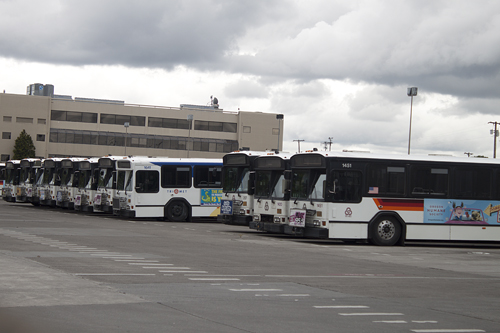
Three years from now, Portlanders can expect to be riding around town on almost 200 new buses. With 55 of the 193 coming sometime this summer, TriMet enacted the reinstatement of its annual bus purchase program, which will gradually add new buses to its fleet. About 40 buses per year would roll in over three years, lowering the average age of the fleet to eight years by 2020 and making it entirely composed of low-floor buses by 2017.
Following the 50 diesel and four hybrid buses that will take the place of an equal number of older buses this summer, TriMet predicts a steady inflow of similar buses until 2015. Outside the annual purchase program, federal grants pick up the tab for additional buses each year. Fourteen of the 54 buses for 2013 will be federally funded. Four of the 44 in 2015 will not only be federally funded but will also hope to set a national precedent with their amped-up hybrid technology.
According to TriMet, the new buses fit into three categories, all of which have hybrid in the name. The first and most populous category is that of the “mini-hybrid” bus, most of which will be acquired under the annual purchase program. These buses carry, among other things, electronic cooling systems that help to achieve a 5–10 percent increase in fuel efficiency. According to TriMet Public Information Officer Roberta Alstadt, the mini-hybrid technology is one “TriMet helped bring to market by providing funding for its development, testing and evaluation for a transit application.”
The next category, of which four will debut this summer, is the standard hybrid bus. According to Alstadt, the extent of the hybridity of these buses stop at the electrification of the propulsion system, whereas a standard hybrid car would likely have more electrified components.
The last and most advanced category is that of the “super-hybrid” bus. These, Alstadt said, will be a green congress of the two other categories, but one that is still in the development process.
“The ‘super’ hybrids will basically be both of these together—electrifying other ancillary systems to allow the bus to operate completely electrically, supported by a diesel generator set. In theory, this would minimize the unnecessary mechanical parasitic losses related to the engine and allow a hybrid to work at maximum efficiency. This would be a first for transit vehicle and would definitely be a green impact to the transit industry as a whole,” Alstadt said.
The catch? “The technology doesn’t exist right now,” Alstadt said. “TriMet is on the forefront of helping develop the technology. Once the four super hybrids are manufactured, TriMet will test it out, studying the impact of these new components on emissions and fuel economy and then report our findings back to the FTA. Once the testing phase has been completed, more tweaks may be done to the technology and then we’ll go from there,” she added.
TriMet’s explanation for the disproportionate amount of mini-hybrid to super-hybrid buses comes down to cost, with the former being cheaper: $440,691 each, versus the latter, individually priced at $625,000.
With TriMet’s extensive financial troubles in mind, some may find the purchase of buses a curious choice, if not an inappropriate one. But thanks to a combination of federal grants and debt service spending, concerns around spending can be somewhat marginalized. Through the Federal Transit Administration’s State of Good Repair and Clean Fuels Program grants, TriMet will receive $7.5 million for the purchase of new buses that will ultimately drive at a commendable cause.
“TriMet is helping to advance the technology used in the transit industry. These innovations will reduce our dependence on oil while improving our environment. I’m proud to support these efforts,” said U.S. Sen. Jeff Merkley (D-Ore.) in a press statement.
Apart from 93 percent of this year’s buses being funded through grants, future annual bus purchases will be through debt service, a method in which TriMet issues bonds to pay for capital investments such as new buses and a new communications system. Likening the bonds to a mortgage on a house and debt service to mortgage payment, Alstadt explained that the bonds are only able to cover capital investments, not operating expenses.
Despite the relatively low number of ultra-green buses appearing in the next few years, the agency remains proud and hopeful. “TriMet has been a leader in developing new technology and innovations that make buses run cleaner and more efficiently,” TriMet General Manager Neil McFarlane said in a press statement. “These federal grants will help us expand on the benefits of hybrids while updating our bus fleet.”

